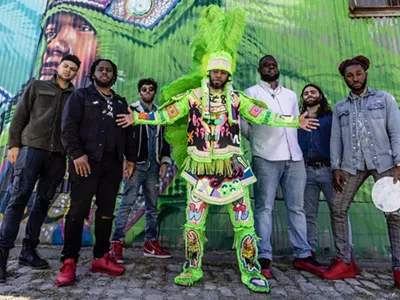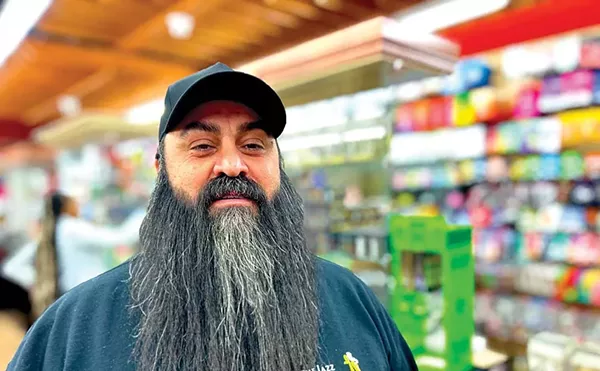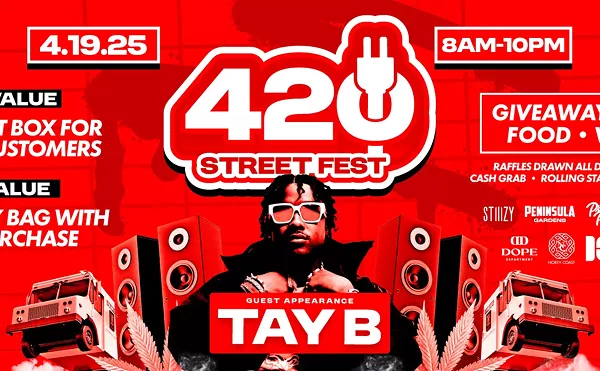Fight over Detroit’s recreational marijuana ordinance gets messier
‘Where’s the weed? It’s not in Detroit,’ a supporter of a new ordinance says

Audio By Carbonatix
[
{
"name": "GPT - Leaderboard - Inline - Content",
"component": "35519556",
"insertPoint": "5th",
"startingPoint": "3",
"requiredCountToDisplay": "3",
"maxInsertions": 100,
"adList": [
{
"adPreset": "LeaderboardInline"
}
]
}
]

Steve Neavling
House of Dank sued the city of Detroit over its recreational marijuana ordinance.
The Detroit Election Commission delivered bad news to advocates of a more robust marijuana industry in the Motor City.
The three-member commission on Monday rejected a ballot initiative that would have given voters an opportunity to overturn the city's much-criticized recreational marijuana ordinance.
But supporters aren't giving up on their goal of creating a more business-friendly ordinance that would wake up the recreational marijuana industry in Detroit.
At issue is the number of signatures collected by Citizens for Better Social Equity, a group pushing to eliminate roadblocks to obtaining a marijuana license under the current ordinance.
Of the 4,844 signatures collected, election officials validated 3,087 of them. Under the Detroit City Charter, 2,811 signatures were needed.
But the Detroit Law Department argues the initiative needs at least 6,475 signatures under the Michigan Regulation and Taxation of Marijuana Act.
Michael P. DiLaura, an attorney for the Detroit-based cannabis company House of Dank, tells Metro Times that the group plans to appeal the commission’s decision.
Adolph Mongo, a spokesman for the group, says the current ordinance, which was passed by the city council in April, will force many of Detroit’s medical marijuana dispensaries to close and will doom the future of recreational cannabis in the city.
“Everyone is asking, ‘Where is the weed?’” Mongo tells Metro Times. “It sure is not in Detroit.”
Adult-use recreational marijuana sales have been legal in Michigan since 2019. But in Detroit, the state’s largest city, the council repeatedly delayed enacting an ordinance to allow recreational dispensaries to open. As a result, dispensaries have cropped up in cities outside of Detroit’s border.
Detroit’s roughly 70 medical dispensaries are struggling to survive. Fewer people are getting medical cannabis cards because they cost money and take time to obtain, and consumers can get marijuana at roughly the same price at nearby recreational dispensaries.
“Why would you go to a medical marijuana dispensary when you can go to Hamtramck or anywhere else and walk in without a card?” Mongo asks. “You are going to have people going out of business after investing hundreds of thousands of dollars. All of those buildings are going to go empty. It’s unreal.”
Detroit’s new ordinance is especially concerning for medical cannabis dispensaries because it prevents them from opening a recreational marijuana business until at least 2027, a provision that drew at least two lawsuits.
In one of the suits, a Wayne County Circuit Court judge issued a temporary restraining order to prevent the city from issuing licenses for dispensaries, micro-businesses, and consumption lounges.
The plaintiffs in the suit — House of Dank and JARS Cannabis — argue the ordinance violates the state’s recreational marijuana law.
Supporters of the ballot initiative view the proposed ordinance as a way to finally open recreational dispensaries. The initiative would enable medical cannabis dispensaries to get a recreational license and allow for unlimited recreational facilities.
Mongo called out Detroit Council Pro Tem James Tate, the author of the ordinance, for refusing to budge on an ordinance that is preventing a burgeoning cannabis industry in the city.
“I don’t think he wants marijuana, period,” Mongo says. “James Tate is adamant. It’s like he’s taking this personally. He’s not moving. The art of politics is the art of negotiations. He sounds like the obstructionists in D.C.”
Mongo says Tate should be recalled because he's single-handedly harmed a fast-growing industry that could provide much-needed jobs in the city.
The city ordinance calls for awarding licenses for up to 100 dispensaries, 30 micro businesses, and 30 consumption lounges. Half of the licenses would go to social equity applicants, who must live in a city that was disproportionately impacted by the war on drugs.
Mongo points out that social equity applicants don’t have to be from Detroit, so the ordinance isn't necessarily a win for residents. Mongo predicts that many of the social equity applicants will be celebrities who don’t need additional opportunities like many of the city’s residents.
“Detroiters get screwed all the way around,” Mongo says.
Metro Times couldn't reach Tate for comment.
The city is late to entering the legal recreational marijuana market, and that could be a major problem for new businesses. The statewide market is now flooded with marijuana products, growers, and dispensaries, causing prices to hit all-time lows and forcing some businesses to sell cannabis at a loss.
For the past two years, Tate has said he's in no rush to develop an adult-use ordinance.
The city began accepting applications for prospective recreational cannabis businesses on April 20, the unofficial annual marijuana holiday.
Doghouse Farms, a brand originally from Oregon, was awarded the city’s first recreational cannabis license to operate a grow facility in Detroit.
You can read the entire proposed new ordinance on the city of Detroit's website.
Stay connected with Detroit Metro Times. Subscribe to our newsletters, and follow us on Google News, Apple News, Twitter, Facebook, Instagram, Reddit, or TikTok.






